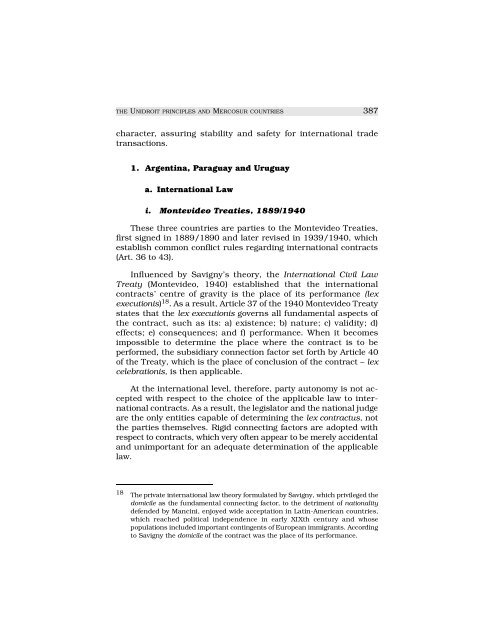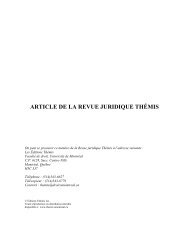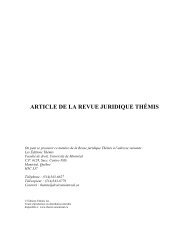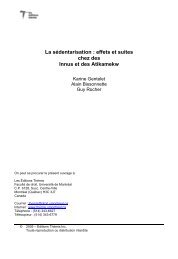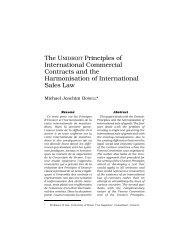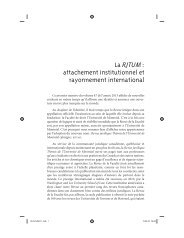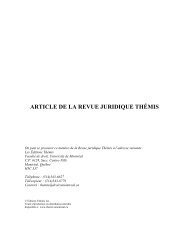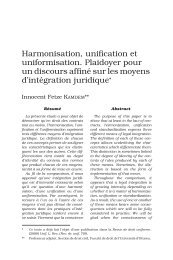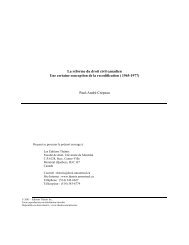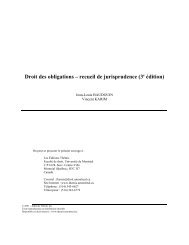The UNIDROIT Principles of International Commercial Contracts and ...
The UNIDROIT Principles of International Commercial Contracts and ...
The UNIDROIT Principles of International Commercial Contracts and ...
You also want an ePaper? Increase the reach of your titles
YUMPU automatically turns print PDFs into web optimized ePapers that Google loves.
THE <strong>UNIDROIT</strong> PRINCIPLES AND MERCOSUR COUNTRIES 387<br />
c h a r a c t e r, assuring stability <strong>and</strong> safety for international trade<br />
transactions.<br />
1. Argentina, Paraguay <strong>and</strong> Uruguay<br />
a. <strong>International</strong> Law<br />
i. Montevideo Treaties, 1889/1940<br />
<strong>The</strong>se three countries are parties to the Montevideo Tre a t i e s ,<br />
first signed in 1889/1890 <strong>and</strong> later revised in 1939/1940, which<br />
establish common conflict rules re g a rding international contracts<br />
(Art. 36 to 43).<br />
I n fluenced by Savigny’s theory, the I n t e rnational Civil Law<br />
Tre a t y (Montevideo, 1940) established that the intern a t i o n a l<br />
contracts’ centre <strong>of</strong> gravity is the place <strong>of</strong> its perf o rmance ( l e x<br />
executionis) 18 . As a result, Article 37 <strong>of</strong> the 1940 Montevideo Treaty<br />
states that the lex executionis g o v e rns all fundamental aspects <strong>of</strong><br />
the contract, such as its: a) existence; b) nature; c) validity; d)<br />
e ffects; e) consequences; <strong>and</strong> f) perf o rmance. When it becomes<br />
impossible to determine the place where the contract is to be<br />
performed, the subsidiary connection factor set forth by Article 40<br />
<strong>of</strong> the Treaty, which is the place <strong>of</strong> conclusion <strong>of</strong> the contract – lex<br />
celebrationis, is then applicable.<br />
At the international level, therefore, party autonomy is not accepted<br />
with respect to the choice <strong>of</strong> the applicable law to international<br />
contracts. As a result, the legislator <strong>and</strong> the national judge<br />
are the only entities capable <strong>of</strong> determining the lex contractus, not<br />
the parties themselves. Rigid connecting factors are adopted with<br />
respect to contracts, which very <strong>of</strong>ten appear to be merely accidental<br />
<strong>and</strong> unimportant for an adequate determination <strong>of</strong> the applicable<br />
law.<br />
18 <strong>The</strong> private international law theory formulated by Savigny, which privileged the<br />
d o m i c i l e as the fundamental connecting factor, to the detriment <strong>of</strong> n a t i o n a l i t y<br />
defended by Mancini, enjoyed wide acceptation in Latin-American countries,<br />
which reached political independence in early XIXth century <strong>and</strong> whose<br />
populations included important contingents <strong>of</strong> European immigrants. Accord i n g<br />
to Savigny the domicile <strong>of</strong> the contract was the place <strong>of</strong> its performance.


